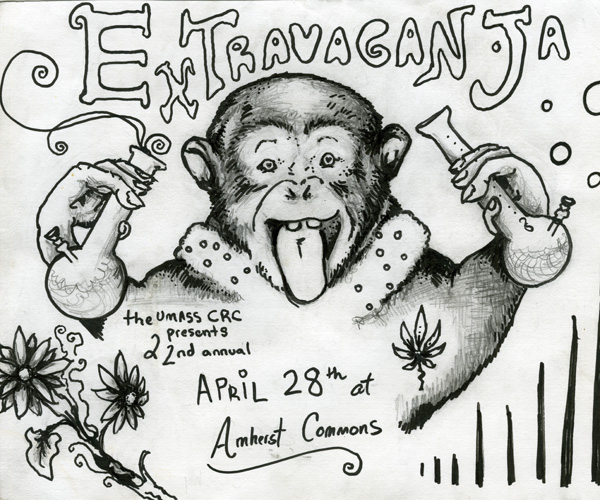Background on Cannabis Reform Coalition

Poster for the annual Extravaganja festival
Considered the oldest student-run organization dedicated to ending the prohibition on marijuana, the Cannabis Reform Coalition (CRC) at UMass Amherst was founded in 1991 and continues to be one of the most active student organizations on campus. Aaron Wilson, a freshman at UMass and at the beginning of a prolific but tragically short career as an activist and champion of personal freedom, founded the CRC on the model of the National Organization for the Reform of Marijuana Laws (NORML). When the CRC was original proposed, Wilson and the CRC ran into resistance from the university administration due to the administration's discomfort using university funds to support efforts to legalize marijuana and that the group's constitution appeared to advocate illegal activity. Wilson and the CRC, after discussions with the Dean of Students Jo-Anne Vanin, were able to officially start the CRC and begin to work toward their goals.
These goals focus on educating students and the local community about the uses of marijuana, dispelling myths about its history and its effects on the human body, and advocating for its legalization on both state and national levels. The highest profile method of achieving these goals has been through the organization of public events. Starting with an all-day celebration of the 200th anniversary of the Bill of Rights, the CRC went on to organize a wide variety of events, including movie nights, lecture series, and concerts, all bringing attention to the movement to legalize marijuana.
The most notable of the CRC's events is the annual Extravaganja, held on the Amherst town common in April. The first Extravaganja in 1992 attracted 500 participants and has swelled to as many as 5,000 each day of the event. Extravaganja has been a source of conflict between the CRC and the Town of Amherst, leading to pressure from the town to keep the event small, and to arrests of participants for marijuana possession. Terry Franklin, a co-founder of the CRC, has continued to advocate on behalf of the CRC and its Extravaganja in Amherst Town Meeting and directly with law enforcement officials.
In addition to these events, the CRC has also been politically active on campus and in the town. In 1993, the CRC introduced a non-binding question on the Student Government Association ballot, which called for a complete legalization of use, sale, and cultivation of marijuana on campus, which passed with a 2-1 vote. The CRC also collected 3,000 signatures of registered voters on a petition to include a non-binding anti-prohibition resolution on the official town ballot in 2000, which passed by a vote of 1659 to 981.
The CRC has also been active in campus media, writing editorials on marijuana usage and legalization for the Daily Collegian and responding to printed misinformation about the drug. Smoke Signals, the newsletter of the CRC, began publication in 1991 and continues to the present in electronic form. The CRC also has an active presence on Twitter and Facebook.
The CRC continues to attract membership and has become increasingly relevant to students as the movement to legalize marijuana grabs a strong foothold. Membership dues, from the organization's founding to the present, are 10 dollars per year.

